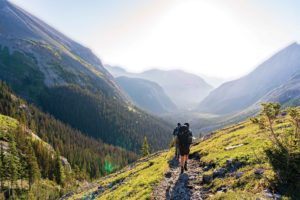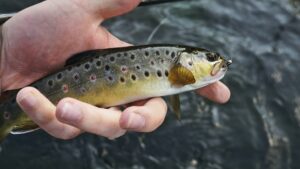Properly selecting a campsite that matches your desires is crucial to a successful camping trip. Luckily here in Canada, we have a massive variety of campsites to choose from. To help ensure you have selected the best destination, we have established the 5 Ws that should be taken into consideration to guarantee safety, and enjoyment.
Weather/Wind
Drastic changes in the weather can be detrimental to any camping trip. In particular, wind and rain can ruin and damage many of the materials that you may have packed, including tents and covers. In extreme cases weather can be very dangerous for campers. This is why it is crucial to make sure that the campsite you select is as protected from the weather as it can be. Trees and heavy vegetation can help provide great coverage. Make sure you are aware of the direction that wind is blowing so that you are able to position your fire downwind from your tent, and other valuable items.
In the summer months, temperatures will rise significantly, and any campsite directly under the sun, will suffer from extreme heat. Make sure that the campsite you select has shade coverage to ensure the safety of all campers. Remember to pack a good supply of sunscreen and light clothing.
Water
You should always pick a campsite near a water source. This is extremely important for drinking water if you have a water filter, it is great for cleaning dishes, and even cleaning yourself and enjoying a swim. Try to make sure that the distance between your campsite and a body of water is 100 feet or less to make sure that in case of a storm or heavy rain fall, your campsite will be protected from flooding. This is why it is also important to pick a spot that is located on a higher ground than the water.
Wildlife
Understanding what wildlife surrounds your campsite is extremely important to ensure the safety of all campers. Make sure that you conduct research on the various types of animals that you may encounter on your trip so that you can plan accordingly. In Canada, we have many diverse eco systems which mean we have many different animals to be aware of. For example, in Northern Ontario, black bears are extremely common. Campers should make sure they pack bear proof canisters, and dispose of waste quickly as to not attract bears.
Another reason to set up your campsite 100 feet or less away from a water source is to make sure you are at a safe distance from where bugs will most predominantly be located. Most insects stay near the water. Fires are also key to protecting your campsite from insects. Remember to pack a good supply of bug spray to protect yourself.
Wildlife does not just refer to animals, plants can also be very dangerous to campers. Make sure you research which plants to be wary of and how to best prepare for plants like poison ivy and poison oak.
Wood
Wood is crucial for almost all campsites. Finding wood that is suitable for a campfire can be quite tricky, this is why it is important to know the types that will, and those that don’t. Always look for wood that is dry, as it will burn the easiest. If it has rained recently and most wood is wet, look for large pieces of dead wood as they will be dry in the centre.
To start a fire, look for dry wood that is small and thin. This will burn up quickly and be a great starting point for your fire. To continue the fire, find larger dry pieces. Never cut down a live tree unless there is no other option. This is because this wood is much more difficult to burn.
It is also very important to bring an axe for splitting wood, or even bring wood yourself (with a super handy firewood carrier) if the campsite permits it. Set aside some time in the afternoon for wood gathering or wood splitting and begin creating the fire. This will ensure you have proper light and warmth for your campsite.
Warnings
Along with the dangerous wildlife and weather that campers should be made aware of, there are many other warnings that campers must prepare for. When selecting a campsite, it is important to be wary of what are called widowmakers. Widowmakers are dead trees or branches that have a high chance of falling on campsites, or campers. When a tree dies, the limbs become extremely weak, and this makes them break apart with sudden gusts of wind, snowfall, or animals that may step on them. This is a major hazard for campers as these branches are extremely heavy and can cause severe injuries. Make sure to check the trees above you and identify any possible widowmakers before setting up your site. Dead branches are often grey in colour, with no leaves. Other possible widowmakers include boulders, or rocks as well.
Another warning that campers should be aware of is waste. Make sure that the campground that you select is clean, and does not have any waste from previous campers. Not only can this attract wildlife, it is also very unhygienic. Make sure that the campsite that you are in is set up for waste removal and will provide trash cans, or even trash disposals for you. Always remember to pack trash bags for excess waste and clean up after you are finished.



